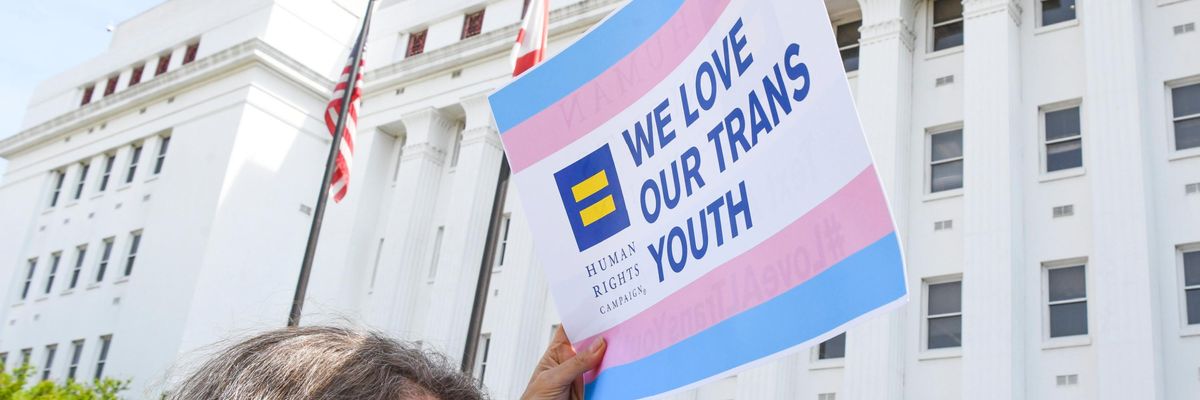The Republican Party's hateful policies are having a predictable result: more hatefulness.
The GOP's current targeted attacks on transgender and nonbinary youths are relatively new, with right-wing governors and legislatures in the last few years prioritizing legislation barring young people from living according to their gender identity—but federal data shows the impact the push is already having on the safety of LGBTQ+ kids, with school hate crimes surging in states where attacks on their right to exist have passed.
According to FBI data analyzed by The Washington Post, in states where LGBTQ+ rights have been restricted, an average of about 28 anti-LGBTQ+ hate crimes at K-12 schools and colleges were reported annually between 2015-19. The number tripled to an average of 90 in 2021-22.
In just K-12 schools, the average number of hate crimes went up from 13 per year between 2015-19 to 61 per year from 2021-22—more than quadrupling.
Overall, across the country, there was an average of 108 hate crimes at schools reported annually between 2015-19. Between 2021-22, the average more than doubled to 232.
At the same time, counseling services like the Trevor Project and the Rainbow Youth Project have seen a sharp rise in calls from young LGBTQ+ people distressed by the political rhetoric that's seeped into their schools.
"My government hates me," "my school hates me," and "they don't want me to exist" are among the fears that young people in states hostile to LGBTQ+ rights regularly report, Lance Preston, founder and executive director of the Rainbow Youth Project told the Post.
"That... is absolutely unacceptable," he said. "That is shocking."
The surge in anti-LGBTQ+ hate crimes did not come as a surprise to advocates including Mark Pitcavage, senior research fellow for the Anti-Defamation League's Center on Extremism.
"Can anybody be surprised if discriminatory laws produce hateful results?" said Pitcavage.
According to the Trevor Project, at least 580 anti-LGBTQ+ bills were being considered in 2023 and at least 53 had been enacted. The Post traced the beginning of the surge back to around 2021.
Recent proposals include a bill advanced by the Florida Legislature to require residents' driver's licenses and ID cards identify them as their sex assigned at birth and a ban on gender-affirming care and transgender students playing on sports teams that match their gender identity in Ohio. The latter was vetoed by Republican Gov. Mike DeWine but later moved forward when lawmakers overrode the veto.
The Post released its analysis weeks after the death of Nex Benedict, a nonbinary student in Oklahoma who used they/them pronouns and died a day after a getting in a physical fight with a group of girls in a school bathroom.
Oklahoma's anti-LGBTQ laws include a ban on gender transition procedures for minors, a law requiring students to use school bathrooms in accordance with their sex assigned at birth, and the so-called Save Women's Sports Act, pertaining to transgender kids on sports teams. The state is also now considering a requirement that schools teach that "a person's sex is an immutable biological trait."
For right-wing politicians and anti-LGBTQ+ activists, said Gillian Branstetter, communications strategist for the ACLU, the surge in hate crimes "is just a sign that their plan is working."
A transgender 17-year-old named Carden, who lives in Virginia, told the Post that he was harassed twice at school this year over his gender identity, and connected the incidents to the mainstreaming of anti-LGBTQ+ rhetoric by right-wing politicians.
"Kids parrot these ideas in their head, it's like, 'Oh, my parents think...,'" Carden told the Post. "Then it translates to being mean to other people their age."
The Rainbow Youth Project, which offers a hotline for crisis counseling to at-risk LGBTQ+ youth, said the top reason for calling cited by its clients in 2023 was "political rhetoric." The group recorded an average of about 1,000 calls per month in 2022 and over 1,400 per month last year.
"This legislated hate," said Alejandra Caraballo of Harvard Law Cyberlaw Clinic, "has consequences."

